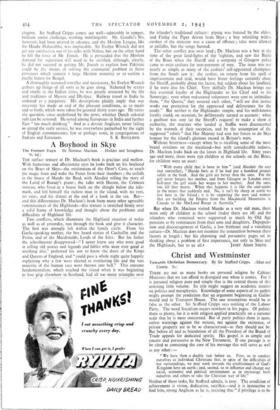A Boyhood in Skye
THE surface texture of Dr. Maclean's book is gracious and mellow. With humorous and affectionate eyes he looks back on his boyhood on the Braes of Skye—the exploration of the Otter's Cave, to reach the magic horn and wake the Feinn from their slumbers the ceilidh in the house of Murdo the Bard, with Alasdair telling the story of the Laird of Raasay's piano ; the talks with Hector, the Crimean veteran, who lived in a house built on the shingle below the tide- mark, and felt himself the richest man in the island, with no rent, no rates, and his dinner at the end of a hook in the sea. But— and this differentiates Dr. Maclean's book from many other agreeable reminiscences of the Highlands—this texture is stretched firmly over a solid frame of knowledge and thought about the problems and difficulties of Highland life.
Two conflicts, which illuminate the Highland situation of today as well as of yesterday, run through the book and give it character. The first was strongly felt within the family circle. From his Gaelic-speaking mother, the boy heard stories of Cuchullin and the Feinn, and of the Macdonalds, Lords of the Isles. But his father the schoolmaster disapproved—" I never knew any who were good at telling old stories and legends and fables who were ever good at anything else," preferred his son to know the dates of the Kings and Queens of England, and " could pass a whole night quite happily explaining why a few were elected to everlasting life and the vast majority of the human race were thrown into hell." This extreme fundamentalism, which reached the island when it was beginning to lose grip elsewhere in Scotland, had all too many triumphs over
the islander's traditional culture: piping was banned by the elders. and Finlay the Piper driven from Skye ; a boy whistling within earshot of the minister was a cause of offence ; tales were allowed at ceilidhs, but the songs banned.
The other conflict was over land ; Dr. Maclean was a boy at the time of the great land-fights of the 'eighties, and saw the Battle of the Braes when the Sheriff and a company of Glasgow police came to evict crofters for non-payment of rent. The issue was not nearly as simple as many of the crofters' self-appointed champions from the South saw it : the crofter, on return from his spell of imprisonment and trial, would have bitter feelings certainly about the Sheriff, probably about the factor, but seldom about his landlord, if he were also his Chief. Very skilfully Dr. Maclean brings out this essential loyalty of the Highlander to his Chief and to his Sovereign : even when red-coated volunteers were sent to intimidate them, " the Queen," they assured each other, " will see that justice works out protection for the oppressed and deliverance for the needy." But neither is the Highlander simple, and his well-known loyalty could, on occasion, be deliberately turned to account : when a gunboat was sent (at the Sheriff's request) to make a show of authority, the marines who landed at Staffin were disconcerted by the warmth of their reception, and by the assumption of the supposed " rebels " that Her Majesty had sent her forces to do Skye honour for the island's glorious record in Britain's wars.
Without bitterness—except when he is recalling some of the more brutal evictions on the mainland—but with considerable sadness, Dr. Maclean looks back on the losses in Highland life. Sixty years ago and more, there were 15o children at the schools on the Braes, for children were an asset:
" With every child that is born to him " (said Alasdair the seer and storyteller), " Murdo feels as if he had put a hundred pounds safely in the bank. And the girls are better than the sons. For the girl never forgets her mother, and from Glasgow or London every half-year the girl sends her wages to her mother. And the sons, too, till they marry. When that happens it is like the coal-seams in the mines that suddenly end. No, it isn't by sheep or cattle we live here in the Island ; it is by exporting the men and women that are building the Empire from the Macdonald Mountains in Canada to the MacLeod Range in Australia."
But when Dr. Maclean visited Murdo as a very old man, there were only 28 children at the school (today there are 18) and the islanders who remained were supported as much by Old Age pensions as by remittances from their sons and daughters. Depopula- tion and discouragement of Gaelic, a low birthrate and a vanishing culture—Dr. Maclean does not examine the connection: between these factors at length ; but his charming and persuasive pages set us thinking about a problem of first importance, not only to Skye and






























 Previous page
Previous page